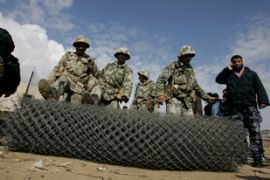Dire scenarios demand Gaza solution
Israel now better placed to cut loose the already isolated Palestinian enclave.

Published On 1 Feb 2008
Israel, according to both media reports and Palestinian officials, is not ready to end its blockade and is now giving out signals that it would reopen the crossing points only if Egypt takes control.
That would mean either of two scenarios.
First, turn over the strip to Egypt and, second, pressure Egypt into sharing “security responsibilities” with Israel to control the Palestinians.
Israeli responsibilities
The first would both absolve Israel from its responsibilities as an occupying power towards the Gaza Strip and reduce the Palestinian entity into a small, fragmented area of the West Bank.
The second would enable Israel to crush any form of Palestinian resistance and would further isolate Gaza.
Both these scenarios would be catastrophic to the Palestinians and place Egypt in a dangerous bind.
While Cairo does not want to be seen as an accomplice in starving a besieged Palestinian population, it cannot afford to leave the border unregulated.
Neither can it afford to thwart Palestinian statehood by splintering it.
PLO officials said they have received a clear message from the Israelis that they are serious about sharing the control of the Rafah crossing exclusively with Egypt, a potential prelude to implementing either of the scenarios mentioned above.
Long-standing slogan
In fact, dumping of Gaza has been a slogan repeated by several Israeli leaders over the years, who viewed the strip and its 1.4 million as a demographic burden and a threat to the Jewish identity of Israel.
But it found renewed interest and support, as Egypt, prompted partly by the humanitarian crisis and concern for the security of its borders, appeared to assume the responsibility of aiding the Gazans by openings its borders and effectively breaking the Israeli siege, at least for a few days.
| Your Views |
In an article in the Jerusalem Post, an American writer has called on the US administration to exert pressure on Egypt to annex Gaza.
“Washington and other capitals should declare the experiment in Gazan self-rule a failure and press President Hosni Mubarak of Egypt to help, perhaps providing Gaza with additional land or even annexing it as a province,” Daniel Pipes wrote.
It is not easy to dismiss Pipe’s article as extremist or marginal view: Pipe is close to the Israeli government and is frequently invited to give his expert testimony to the US congress.
He often echoes views from within the Israeli government.
New dimension
The continued Israeli siege and the new dimension it gave to the conflict between the Hamas and Fatah movements is conducive to such extreme scenarios as all sides fear chaos in the border area.
Pre-empting such scenarios would require reaching an immediate arrangement supported by the two rival Palestinian movements that allows the reopening of the border.
The Fatah-led Palestinian Authority (PA), supported by Arab and Western governments, is seeking to reinstate the international agreement that gives it control over the Rafah crossing.
So far both Israel and Hamas have rejected the return to status quo for their own different reasons. Israel is not ready to give up its declared goal of crushing Hamas or the unprecedented opportunity to challenge both the Palestinians and Egypt.
Hamas sees a return to business as usual paramount to ceding power back to the PA and, more significantly, giving Israel actual control over the crossings along with the opportunity to stifle the Islamic resistance movement.
EU observers
The agreement that regulates the border crossings, while giving the PA Presidential Guard the role of patrolling them, stipulates the presence of European Union observers, while Israel retains veto power over the movement of goods and people.
Many Palestinian analysts and political leaders would agree with Hamas in its demand for changing the existing agreement that allows Israel to continue its punitive closure policies.
However, fear of Israel succeeding to strip the Palestinians from any right to patrol the crossing and an eventual assertion of Egyptian control has made finding an immediate solution all the more urgent.
It has prompted both Mahmoud Abbas, the Palestinian president, and Khaled Mashaal, the Hamas leader, to start separate talks with the Egyptian government to reach an agreement.
Further apart
But so far their positions are far apart.
A proposal, originally put by Salam Fayyad, the Palestinian prime minister, to restore the PA security and EU presence at the crossing, involves the creation of a buffer zone between the terminal and the point where Hamas security control starts within the enclave.
It has been rejected by Hamas.
Thus, while Gazans got their short taste of freedom last week, a combination of Israeli policies, Arab weakness and internecine fighting may eventually see the fate of Gaza and that of Palestinians being determined by Israel, the US and, to a lesser extent, the Arab governments.
The writer is an Al Jazeera Middle East analyst.
Source: Al Jazeera